情态动词(完整版)
情态动词的用法 完整版
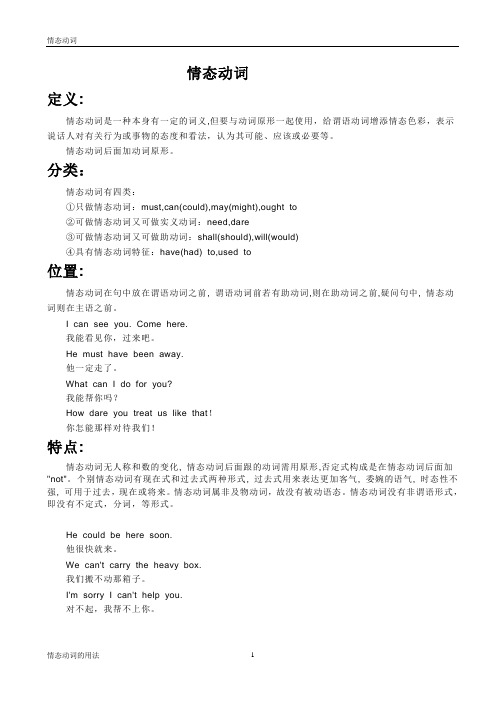
情态动词定义:情态动词是一种本身有一定的词义,但要与动词原形一起使用,给谓语动词增添情态色彩,表示说话人对有关行为或事物的态度和看法,认为其可能、应该或必要等。
情态动词后面加动词原形。
分类:情态动词有四类:①只做情态动词:must,can(could),may(might),ought to②可做情态动词又可做实义动词:need,dare③可做情态动词又可做助动词:shall(should),will(would)④具有情态动词特征:have(had) to,used to位置:情态动词在句中放在谓语动词之前, 谓语动词前若有助动词,则在助动词之前,疑问句中, 情态动词则在主语之前。
I can see you. Come here.我能看见你,过来吧。
He must have been away.他一定走了。
What can I do for you?我能帮你吗?How dare you treat us like that!你怎能那样对待我们!特点:情态动词无人称和数的变化, 情态动词后面跟的动词需用原形,否定式构成是在情态动词后面加"not"。
个别情态动词有现在式和过去式两种形式, 过去式用来表达更加客气, 委婉的语气, 时态性不强, 可用于过去,现在或将来。
情态动词属非及物动词,故没有被动语态。
情态动词没有非谓语形式,即没有不定式,分词,等形式。
He could be here soon.他很快就来。
We can't carry the heavy box.我们搬不动那箱子。
I'm sorry I can't help you.对不起,我帮不上你。
基本助动词与情态助动词最主要的区别之一是,基本助动词本身没有词义,而情态助动词则有自己的词义,能表示说话人对有关动作或状态的看法,或表示主观设想:What have you been doing since? (构成完成进行体,本身无词义)I am afraid I must be going. (一定要)You may have read some account of the matter. (或许已经)除此之外,情态助动词还有如下词法和句法特征:1)除ought和used以外,其他情态动词后面只能接不带to的不定式。
(完整版)情态动词用法归纳

情态动词用法归纳情态动词有can (could), may (might), must, have to, shall (should, will (would), dare (dared), need (needed), ought to等. 情态动词无人称和数的变化;不能单独使用,必须与其后的动词原形构成谓语一、 can, could1) can, could表示能力(体力、知识、技能). Can you lift this heavy box?(体力)Mary can speak three languages。
(知识) Can you skate?(技能)此时可用be able to代替.用be able to改写上面三个句子。
Can只有一般现在时(can)和一般过去式(could);而be able to则有更多的时态。
am/is/are able to(一般现在时):I am able to do this job,其它几个自己改写was/were able to(一般过去式): He was able to do this jobwill be able to(一般将来时):I will(won't) be able to do this job this afternoonI'll not be able to come this afternoon.当表示“经过努力才得以做成功某事”时应用be able to,不能用Can.如:He can’t swim,but he is able to cross the river.2) can, could表示请求和允许。
—-———Can I go now? =May I go now?——-—- Yes, you can。
/ No,you can’t.=Yes,you may。
/No,you may not.此时可与may互换。
(完整版)初中情态动词用法总结

一情态动词的用法和辨析,情态动词表示推测和可能,由情态动词引导的一般疑问句的回答。
二 1 只是情态动词: can, could, may, might, must2 可做情态动词,可做实义动词: need, dare3 可做情态动词,可做助动词: will, would, shall, should4 特殊: have to, ought to, used to三 1 有一定的词义,但不能单独作谓语,必须与行为动词和系动词连用构成谓语。
2 无人称和数的变化。
( have to 除外)Eg: He has to stay here.3 后接动词原形。
4 具有助动词作用,可构成否定,疑问或简短回答。
四① 表示能力,“能,会”。
Eg : Can you play basketball?② 表示怀疑,猜测,常用于否定句或疑问句。
Eg :Li hua can’t be in the classroom.③ 表示请求,允许,多用于口语,译“可以”= may.Eg: youcangonow.④can 开头的疑问句,肯定句,否定句用 can 或 can’t.①can 的过去式,表示过去的能力。
Eg :I could swim when I was seven years old.②could 开头的疑问句,肯定和否定回答用 could, couldn’ t 如果 could 表示现在的委婉,用 can 回答。
Eg: Could I have a drink? Yes, you can.① 表示推测,“可能,也许”,用于肯定句。
Eg: He may come tomorrow.② 表示请求,“许可,可以”。
Eg: May I borrow your book?注:表示请求,许可时,主语为第一人称的一般疑问句,否定回答用 mustn’t“不可以,禁止,不许”,不用may not“可能不”。
③表示祝愿。
Eg :May you success.①表示“可以”,用于过去时中。
情态动词(完整版)

情态动词(完整版)一、单项选择情态动词1.If we had paid enough attention to the issue of the heavily-overloaded vehicles, the tragedy of the collapse of an overpass in Wuxi _____ avoided.A.should B.could be C.should have been D.could have been 【答案】D【解析】【详解】考查情态动词用法。
句意:如果我们对超载车辆问题给予足够的重视,就可以避免无锡立交桥垮塌的悲剧。
本句为“情态动词+have done”结构,结合句意表示“本来可以;本来能够”应用could have done结构,且主语与谓语动词avoid构成被动关系,故应用be done形式。
故选D。
【点睛】情态动词+have done的结构和用法有以下几种:一、must have done sth.“一定做了某事”。
表示对过去事情的较有把握的推测,这时只能用在肯定句中,“肯定/必须已经干过……”,在否定句和疑问句中用can’t或could n’t或can/ could,例如:1.From what you said, she must have told you all about it. 从你的话看,她一定告诉了你所有的事情。
二、can/could have done sth.本来能够做某事,而实际上未做;1.But we could have done it all so much better. 但是,我们本可以把这一切做得更好。
三、can't/couldn't have done sth.不可能做过某事;1. We could't have done it without you.没有你我们办不成这事。
四、ought to/should have done sth.过去本应该做某事而实际上并没有做。
【英语】情态动词(完整版)
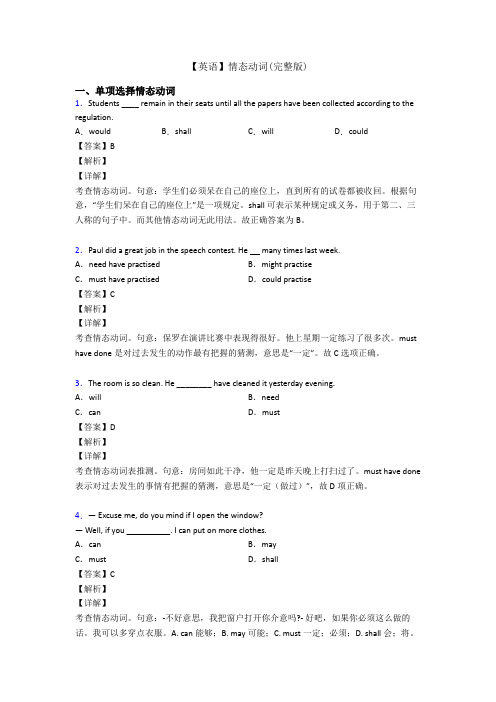
【英语】情态动词(完整版)一、单项选择情态动词1.Students ____ remain in their seats until all the papers have been collected according to the regulation.A.would B.shall C.will D.could【答案】B【解析】【详解】考查情态动词。
句意:学生们必须呆在自己的座位上,直到所有的试卷都被收回。
根据句意,“学生们呆在自己的座位上”是一项规定。
shall 可表示某种规定或义务,用于第二、三人称的句子中。
而其他情态动词无此用法。
故正确答案为B。
2.Paul did a great job in the speech contest. He many times last week.A.need have practised B.might practiseC.must have practised D.could practise【答案】C【解析】【详解】考查情态动词。
句意:保罗在演讲比赛中表现得很好。
他上星期一定练习了很多次。
must have done是对过去发生的动作最有把握的猜测,意思是“一定”。
故C选项正确。
3.The room is so clean. He ________ have cleaned it yesterday evening.A.will B.needC.can D.must【答案】D【解析】【详解】考查情态动词表推测。
句意:房间如此干净,他一定是昨天晚上打扫过了。
must have done 表示对过去发生的事情有把握的猜测,意思是“一定(做过)”,故D项正确。
4.— Excuse me, do you mind if I open the window?— Well, if you __________. I can put on more clothes.A.can B.mayC.must D.shall【答案】C【解析】【详解】考查情态动词。
(完整版)初中英语情态动词用法大全

情态动词用法归纳情态动词有can (could), may (might), must, have to, shall (should, will (would), dare (dared), need (needed), ought to等。
情态动词无人称和数的变化;不能单独使用,必须与其后的动词原形构成谓语一、can, could1) 表示能力(体力、知识、技能)。
Can you lift this heavy box?(体力)Mry can speak three languages.(知识)Can you skate?(技能)此时可用be able to代替。
Can只有一般现在时和一般过去式;而be able to则有更多的时态。
I’ll not be able to come this afternoon.当表示“经过努力才得以做成功某事”时应用be able to,不能用Can。
如:He was able to go to the party yesterday evening in spite of the heavy rain.2) 表示请求和允许。
-----Can I go now?----- Yes, you can. / No, you can’t.此时可与may互换。
在疑问句中还可用could,might代替,不是过去式,只是语气更委婉,不能用于肯定句和答语中。
---- Could I come to see you tomorrow?---- Yes, you can. ( No, I’m afraid not. )3) 表示客观可能性(客观原因形成的能力)。
They’ve changed the time table, so we can go by bus instead.This hall can hold 500 people at least.4) 表示推测(惊讶、怀疑、不相信的态度),用于疑问句、否定句和感叹句中。
情态动词完整版
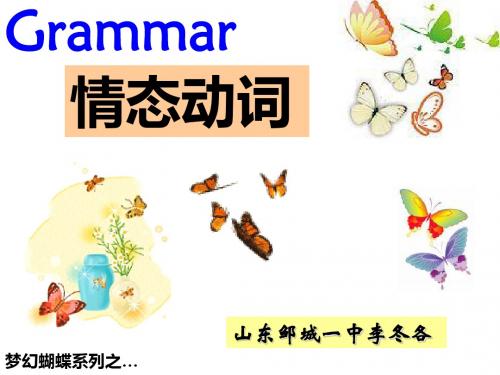
D. __非__得__,__应__要__________
-- May I smoke here? -- If you ____, choose a seat in the smoking
section. A.should B. could C. may D. must
B.John, look at the time. ____ you play the C.piano at such a late hour? D.A. Must B. Can C. May D. Need
B. could可代替can表示请求, 语气委婉
eg. Could you lend me your dictionary? Could I use your bike?
3) can’t /couldn’t have done 过否猜
eg. They can't /couldn’t have gone out because the light is still on.
• C. _表___请__求__或__许__可____:
eg. Can I sit here? Can I leave now?
-- Can I use your bike tomorrow morning? -- Yes, you can.
can 的用法: A. 表示能力; B. 表推测,可能性 C. 表请求或许可
must 的主要用法:
A. ___表__示___必__然___性__。__
eg: We must all die. 人总要死的。
B. _表___推___测__,___判__断___,__有___把___握的
He always comes first in exams. He must work very hard. You get the first prize, and you must be very happy now.
(完整版)情态动词归纳表

情态动词归纳表高考热点透视热点一:表猜测的情态动词的用法。
热点二:情态动词+have done情态动词+have done的用法有两种含义:1. 对过去情况的猜测。
由表猜测的情态动词+have done构成。
上表已经提到。
2. 表示与过去事实的主观设想。
有轻微的责备、后悔之意。
请参看下表:热点三:shall,will,must等1. Shall ①用于第一人称疑问句中表示说话人征求对方的意见或向对方请求。
例:—The room is so dirty. _______ we clean it?—Of course. ( 03 上海春招)A. WillB. ShallC. WouldD. Do②用于第二人称陈述句表示说话人或他人的意图、命令、允诺、警告、命令等。
例:“The interest _______ be divided into five parts, according to the agreement made by both sides,” declared the judge. (04 重庆,24)A. mayB. shouldC. mustD. shall2. Will ①表示意愿或意志。
例:I __________ argue with you.②当主语是物时,则表示“不起作用”。
例:The drawer _________ shut.3. Must 表“必须、一定要”。
例:— Who is the girl standing over there?— Well, if you _______ know, her name is Mabel. (02,天津)A. mayB. canC. mustD. shall。
(完整版)情态动词must、can、could、may、might精解

would : 1. 表 will 的过去 ,用于过去未来时2.表 "意向 ",愿意做某事3.虚构语气could: 1. 表 can 的过去 ,表过去的能力2表恳求 (委宛语气 )3.表猜想 :可能是 ...4.虚构语气should: 1. 表 shall 的过去 ,用于过去未来时,搭配第一人称2.表委宛的语气 : 应当做 ...3.虚构语气might: 1. may 的过去 ,表猜想 :可能是2.表允许 (委宛语气 )may:1. 表猜想 : 可能是think of shall 和2. 表允许想起 , 想到 ; 没有 think fromwill 的用法的用法一.1、 shall 用在第一、三人称,will用于第二人称表示“征采建议”。
Shall I go now?Shall we invite her, too?Will you help me with the work?Shall the reporters wait outside or what?2、 shall 表示依照规定有义务去做。
Passengers shall not talk with the driver while the bus is moving.3、 shall 用于全部人称,表示说话人的承诺、威迫、警示、命令等。
You shall have an answer by tomorrow.If he’ s good, he shall have a new watch for Christma.If you children don’ t do as I tell you, you shan ’ t go to the party. 4、 would 能够表示过去的习惯(would 可表示频频发生的动作或某种偏向。
used to 表示过去的习惯动作或状态,重申此刻已不存在)He would come to see me on Sunday when he was here.The dog would lie there in the sun all afternoon.When we were children, we would go skating every winter.5、 will 能够表示“愿意” ,而非未来 :I will pay you for it.我会付给你钱买下它的。
(完整版)情态动词should的讲解
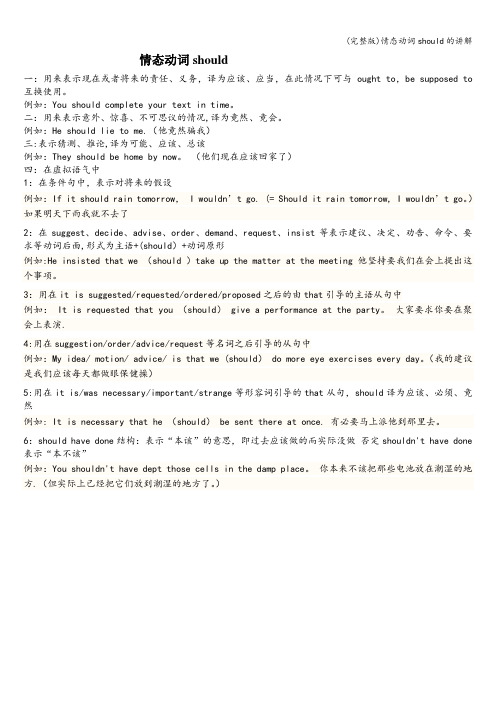
(完整版)情态动词should的讲解情态动词should一:用来表示现在或者将来的责任、义务,译为应该、应当,在此情况下可与ought to,be supposed to 互换使用。
例如:You should complete your text in time。
二:用来表示意外、惊喜、不可思议的情况,译为竟然、竟会。
例如:He should lie to me.(他竟然骗我)三:表示猜测、推论,译为可能、应该、总该例如:They should be home by now。
(他们现在应该回家了)四:在虚拟语气中1:在条件句中,表示对将来的假设例如:If it should rain tomorrow,I wouldn’t go. (= Should it rain tomorrow, I wouldn’t go。
)如果明天下雨我就不去了2:在suggest、decide、advise、order、demand、request、insist等表示建议、决定、劝告、命令、要求等动词后面,形式为主语+(should)+动词原形例如:He insisted that we (should )take up the matter at the meeting 他坚持要我们在会上提出这个事项。
3:用在it is suggested/requested/ordered/proposed之后的由that引导的主语从句中例如: It is requested that you (should) give a performance at the party。
大家要求你要在聚会上表演.4:用在suggestion/order/advice/request等名词之后引导的从句中例如:My idea/ motion/ advice/ is that we (should) do more eye exercises every day。
(完整版)高考情态动词讲解

语法专题(三)情态动词考点归纳考点一:情态动词表示能力1.表现在的或一般的能力:表示现在的或一般的能力用can或be able to,can 比be able to 使用得更普遍。
can 侧重指有能力做某事;而be able to更强调通过努力、克服困难做成某事。
A computer can't think for itself ;it must be told what to do.He is a native speaker of English,so he can of course speak English quite well.2.表示将来的能力:表示将来能力用will be able to。
If you have a good sleep,you will be able to work out this problem.如果你睡个好觉,你就能做出这道题。
3.表示过去的能力:could 表示过去一般的能力,即不表示做或未做某事;而was (were) able to do则表示过去有能力并且成功地做了某事,相当于managed to do something/succeeded in doing somethin。
g考点二:情态动词表示推测(可能性)可能性可分为客观的(理论的)可能性和具体事情实际发生的可能性。
1.客观的(理论的)可能性指并不涉及具体某事是否会发生,此种用法常常可以说明人或事物的特征。
can 用于肯定句中表示客观的(理论的)可能性,can用于疑问及否定句中则表示实际发生的可能性。
The World Wide Web is sometimes jokingly called the World Wide Wait because it can be very slow.A left- luggage office is a place where bags can be left for a short time,especially in a railway station.2.表示具体事情实际发生的可能性:表示具体事情实际发生的可能性的这些词后接动词原形是对现在事情的推测,后接完成式则表示对过去事情的推测;其中can,may/might,should,ought to,must 有时还可接进行时表示对现在正在进行的事情的推测。
完整版情态动词笔记

情态动词一、情态动词的定义和特点1.定义情态动词本身有一定的词义,表示说话人的某种感情或语气,对某一动作或状态的某种态度,表示“可以”“需要”“应该”等意义。
2.特点(1)不能单独作谓语,后面只能跟动词原形。
(2)没有人称和数的变化,但有些情态动词,如can, will有一般式和过去式的变化。
(3)情态动词的“时态”形式并不是区分时间的主要标志。
不少情况下,情态动词的现在时形式和过去时形式可用来表示现在时间、过去时间或将来时间。
二、基本用法1.can/could(1)表示能力或客观可能性;还可以表示请求和允许。
She can speak English.—Can I go now?—Yes, you can.——我现在可以走了吗?——是的,你可以。
温馨提示:①could也可表示请求,语气委婉,主要用于疑问句,答语应用can —Could I come to see you tomorrow?—Yes,you can.②can表示能力时,还可用be able to代替。
如:I’ll not be able to come this afternoon.(2)表示推测。
can 表示推测(用于否定句或者疑问句),把握很大;could也可表推测,把握比can 小。
—Look! Someone is coming! Who can it be?——看,有人来了,会是谁呢?—It can’t be him. He has gone to Paris.——不可能是他,他去了巴黎。
(3)用于肯定的陈述句中,表示理论上或习惯上的可能性。
It can be quite cold here in winter,这里的冬天有时还真够冷的。
It could be very exciting to go out for a drive.出去开车兜风可能会令人兴奋。
(could比can的可能性小)2.may/might(1)表示许可。
(完整版)情态动词can,may,must的用法

You must do your homework first. 2. must表示 一定(肯定性推测 )
He must be at home.
must / must not
must not的用法:
1. mustn’t表示禁止(不准;不允许) You mustn’t smoke here.
You _c__a_n___ do it this evening. 17. May I use your dictionary ? Sorry , you __c_a_n__’t___.
I am using it now .
18. Look at the ground .It’s very wet .It _m___u_s_t_
情态动词can, may, must的用法
Modal verbs 情态动词
• 情态动词后接动词原形; • 没有人称和数的变化; • 不能单独作谓语, 与后面的动词共同作谓语; • 其否定形式在后面直接加not。
Modal verbs 情态动词
• can / can not • may / may not • must / must not
can / can not
1. 表示能力(会) Mary can speak English, but she can not speak French.
2. 表示允许(可以) Can I use your dictionary? I can’t find mine.
3. 表示推测 (可能 ) ----通常用于否定形式 He can’t be in the office. I saw him go out just now.
(完整版)情态动词大全
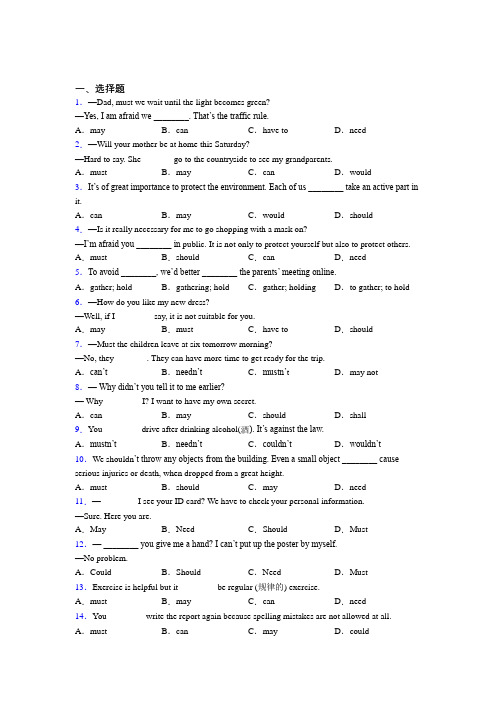
一、选择题1.—Dad, must we wait until the light becomes green?—Yes, I am afraid we ________. That’s the traffic rule.A.may B.can C.have to D.need2.—Will your mother be at home this Saturday?—Hard to say. She _______go to the countryside to see my grandparents.A.must B.may C.can D.would3.It’s of great importance to protect the environment. Each of us ________ take an active part in it.A.can B.may C.would D.should4.—Is it really necessary for me to go shopping with a mask on?—I’m afraid you ________ in public. It is not only to protect yourself but also to protect others. A.must B.should C.can D.need5.To avoid ________, we’d better ________ the parents’ meeting online.A.gather; hold B.gathering; hold C.gather; holding D.to gather; to hold 6.—How do you like my new dress?—Well, if I ________ say, it is not suitable for you.A.may B.must C.have to D.should 7.—Must the children leave at six tomorrow morning?—No, they _______. They can have more time to get ready for the trip.A.can’t B.needn’t C.mustn’t D.may not 8.—Why didn’t you tell it to me earlier?— Why ________ I? I want to have my own secret.A.can B.may C.should D.shall9.You ________ drive after drinking alcohol(酒). It’s against the law.A.mustn’t B.needn’t C.couldn’t D.wouldn’t10.We shouldn’t throw any objects from the building. Even a small object ________ cause serious injuries or death, when dropped from a great height.A.must B.should C.may D.need11.—________ I see your ID card? We have to check your personal information.—Sure. Here you are.A.May B.Need C.Should D.Must12.—________ you give me a hand? I can’t put up the poster by myself.—No problem.A.Could B.Should C.Need D.Must 13.Exercise is helpful but it ________ be regular (规律的) exercise.A.must B.may C.can D.need14.You ________ write the report again because spelling mistakes are not allowed at all. A.must B.can C.may D.could15.—Where is Tom? I am considering ________ him about the result of the exam.—Oh. You ________. He has known it already.A.to tell; can't B.telling; needn't C.tell; mustn't D.told; shouldn't 16.When you visit a museum, some instructions should ________ and we’d better not ________ them.A.pay attention to; be against B.be paid attention; againstC.be paid attention to; against D.be paid attention to; be against17.—The high school entrance examination is coming!—Yes, our teacher tells us we _______ be too careful while taking exams.A.mustn't B.shouldn't C.needn't D.can't18.When I was young, my father ___________ take me to climb the hill which was not far from our house.A.may B.must C.would D.should19.Dr. Zhong Nanshan once said, "To prevent the spread of this disease, we________never be too careful."A.can B.may C.must D.should 20.—There is a knock at the door.—It ________ be my mom. She always comes back home at this time.A.may B.may not C.must D.can’t21.—Will dad arrive home at 6 o’clock to have dinner with us this evening?— I think he will, but he ________ not. Sometimes he works extra hours.A.can B.must C.need D.may 22.According to the rule, used batteries ________ be dropped in the red bin for harmful wastes. A.may B.would C.should D.might23.You _________ smoke here! Look at the sign. It says "No smoking".A.needn't B.mustn't C.can D.may24.—Must I finish all my homework today, Mum?—No, you ________, my dear. You can finish some tomorrow if you like.A.needn’t B.shouldn’t C.can’t D.mustn’t25.—Is that Mr Zhou?—It ________ be him. He has gone to Beijing.A.can B.may C.can’t D.shouldn’t 26.Never throw objects from the building. Even a small object ________ cause serious injuries, or death, when dropped from a great height.A.must B.should C.may D.need27.—In China, many parents complain that their children have to stay up late to do the homework.—Don’t worry. The government has realized the problem. I’m sure there ________ be good news soon.A.can B.should C.need D.must28.— Is the boy over there Tom? He often wears a jacket like that.— It _______ be him. He is absent from school today.A.needn’t B.shouldn’t C.mustn’t D.can’t29.We teenagers ________ have dreams. With dreams and hard work, anything amazing________ be created.A.may; can B.might; should C.should; can D.must; has to 30.When people are waiting at the zebra crossing, cars and buses ________ wait and let them go first.A.must B.may C.can D.need31.A hard-working man ________ become a great scientist, but a great scientist ________ be a hard-working man.A.can’t; can B.may not; must C.can’t; must D.may not; can 32.—Seventy dollars for such a dress! You ________ be joking!—I’m serious. It’s made of silk from Hangzhou.A.must B.need C.will D.can33.—Must we stop the Japanese government discharging nuclear waste water (排放核污水) into the Pacific Ocean?—________. Because everyone should protect our earth and it is bad ________ us to eat the polluted seafood and drink the waste water.A.Yes, we can; of B.No, we mustn’t; of C.Yes, we must; for D.No, we needn’t; for 34.Cars ________ give way to walkers on some roads in Binhai, or the drivers will be fined. A.may B.will C.can D.must 35.Sometimes smiles ________ be false, hiding other feelings like anger, fear or worry. A.should B.would C.must D.can36.— The sandstorm in Beijing is so serious this year.— Yes, I wonder when we ________ worry about the air we breathe.A.can’t B.mustn’t C.needn’t D.shouldn’t37.For the safety of the passengers, objects like guns ________ be carried on board.A.may not B.needn’t C.might not D.mustn’t 38.—How beautiful the winter jasmines (迎春花) are!—Yes. These golden-yellow flowers ________ be widely seen in my city in March.A.must B.can C.would D.should 39.—Who’s the man over there? Is that Mr. Black?—It ________ be him. Mr. Black is much taller than that man.A.may B.must C.can’t D.mustn’t40.You ________ pay too much attention to protecting yourself if you plan to go abroad. A.mustn’t B.can’t C.shouldn’t D.needn’t【参考答案】一、选择题1.C解析:C【详解】句意:——爸爸,我们一定要等绿灯吗?——是的,恐怕我们必须这样做。
(完整版)小学英语情态动词知识点及练习

神情动词【知识要点】 :神情动词( Modal verbs )自己有必然的词义,表示语气的单词。
但是不能够独立作谓语,只能和动词原形一起构成谓语。
神情动词用行家为动词前,表示说话人对这一动作或状态的看法或主观设想。
神情动词诚然数量不多,但用途广泛,主要有以下:can (could), may (might), must, need, ought to,dare (dared), shall (should), will (would) must not.神情动词无人称和数的变化,神情动词后边跟的动词须用原形,否定式构成是在神情动词后边加 "not" 。
疑问形式是将神情动词提至主语前。
个别神情动词有现在式和过去式两种形式,过去式用来表达更加客气,宛转的语气,时态性不强,可用于过去,现在或将来。
神情动词属非及物动词,故没有被动语态。
【典型例题】:【专题一】 : can 和 could 的用法【例 1】 Can you lift this heavy box? ( 体力 )【剖析】表示能力 ( 体力、知识、技术 )【练习】1. Mary speak three languages.( 知识 )2.you skate?( 技术 )此时可用 be able to 代替。
Can 只有一般现在时和一般过去式则有更多的时态。
; 而be able toI ’ ll not be able to come this afternoon.be able to,不能够用Can。
当表示“经过努力才得以做成功某事”时应用【例 2】-----Can I go now?-----Yes, you can. / No, you can’t.【剖析】表示恳求和赞同。
此时可与 may互换。
在疑问句中还可用 could,might 代替 , 不是过去式 , 可是语气更宛转 , 不能够用于必然句和答语中。
【练习】----I come to see you tomorrow?---- Yes, you.---- No, you/I ’m afraid not.【例 3】 Can this be true?【剖析】表示推断 ( 惊讶、思疑、不相信的态度 ), 用于疑问句、否定句和惋惜句中。
情态动词(完整版)
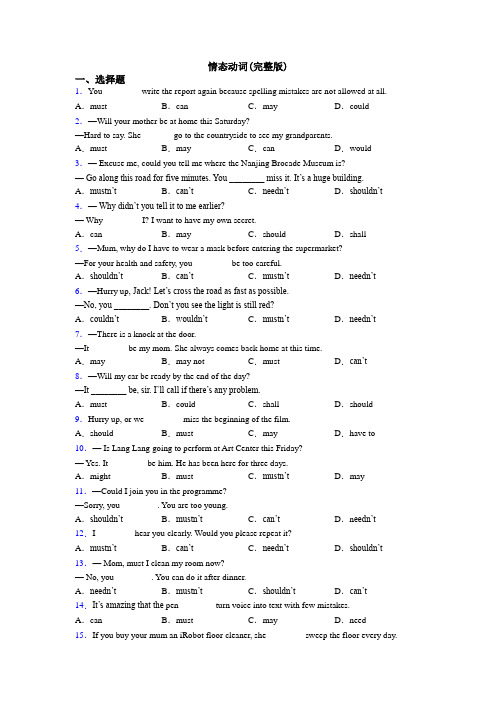
情态动词(完整版)一、选择题1.You ________ write the report again because spelling mistakes are not allowed at all. A.must B.can C.may D.could 2.—Will your mother be at home this Saturday?—Hard to say. She _______go to the countryside to see my grandparents.A.must B.may C.can D.would 3.— Excuse me, could you tell me where the Nanjing Brocade Museum is?—Go along this road for five minutes. You ________ miss it. It’s a huge building. A.mustn’t B.can’t C.needn’t D.shouldn’t 4.—Why didn’t you tell it to me earlier?— Why ________ I? I want to have my own secret.A.can B.may C.should D.shall 5.—Mum, why do I have to wear a mask before entering the supermarket?—For your health and safety, you ________ be too careful.A.shouldn’t B.can’t C.mustn’t D.needn’t 6.—Hurry up, Jack! Let’s cross the road as fast as possible.—No, you ________. Don’t you see the light is still red?A.couldn’t B.wouldn’t C.mustn’t D.needn’t 7.—There is a knock at the door.—It ________ be my mom. She always comes back home at this time.A.may B.may not C.must D.can’t 8.—Will my car be ready by the end of the day?—It ________ be, sir. I’ll call if there’s any problem.A.must B.could C.shall D.should 9.Hurry up, or we ________ miss the beginning of the film.A.should B.must C.may D.have to 10.— Is Lang Lang going to perform at Art Center this Friday?— Yes. It ________ be him. He has been here for three days.A.might B.must C.mustn’t D.may 11.—Could I join you in the programme?—Sorry, you ________. You are too young.A.shouldn’t B.mustn’t C.can’t D.n eedn’t 12.I ________ hear you clearly. Would you please repeat it?A.mustn’t B.can’t C.needn’t D.shouldn’t 13.— Mom, must I clean my room now?— No, you ________. You can do it after dinner.A.needn’t B.mustn’t C.shouldn’t D.can’t 14.It’s amazing that the pen ________turn voice into text with few mistakes.A.can B.must C.may D.need15.If you buy your mum an iRobot floor cleaner, she ________ sweep the floor every day.A.can’t B.mustn’t C.needn’t D.shouldn’t 16.—Shall we go camping this summer holiday?—Nothing________be better.A.should B.could C.must D.may17.My bike was broken yesterday,so I____walk home.A.might B.had to C.must D.could 18.—Would you please________in that way? That’s not safe!—Sorry. I won’t do it any more.A.not driving B.not to drive C.no driving D.not drive 19.Dr. Zhong Nanshan once said, "To prevent the spread of this disease, we________never be too careful."A.can B.may C.must D.should 20.—Dad, must we wait until the light becomes green?—Yes, I am afraid we ________. That’s the tra ffic rule.A.may B.can C.have to D.need 21.Sometimes smiles ________ be false, hiding other feelings like anger, fear or worry. A.should B.would C.must D.can22.You _________ smoke here! Look at the sign. It says "No smoking".A.needn't B.mustn't C.can D.may23.— Listen! Tom ________ be listening to the music while doing his homework.—Let’s go upstairs to remind him to turn it off.A.should B.could C.would D.must24.—Must I finish all my homework today, Mum?—No, you ________, my dear. You can finish some tomorrow if you like.A.needn’t B.shouldn’t C.can’t D.mustn’t 25.—Will Jim come to Yangzhou for a holiday?—He ________come and it depends on how much homework he will have.A.may B.should C.must D.need26.—Is it usually warm in Yancheng in May?—Yes. But it _______ be rather cold sometimes.A.must B.should C.would D.can27.When people are waiting at the zebra crossing, cars and buses ________ wait and let them go first.A.must B.may C.can D.need28.—Shall I tell him the change of the time right now?—I’m afraid you ________, otherwise he will be late for the meeting.A.can B.may C.must D.need29.—I must go to school today, ________?—No, you ________.You can go as soon as you get well.A.mustn’t I;needn’t B.needn’t I;needn’tC.mustn’t I;mustn’t D.needn’t I;mustn’t30.Look at the floor, Tom! ________ you watch TV while having a meal?A.Should B.Could C.Must D.May31.A hard-working man ________ become a great scientist, but a great scientist ________ be a hard-working man.A.can’t; can B.may not; must C.can’t; must D.may not; can 32.Mr. Black ________ be at home now. He went abroad on vacation last Friday.A.can’t B.mustn’t C.needn’t D.shouldn’t 33.—The article says that a person’s animal sign decides his personality.—You ________ read it for fun, but don’t believe in that.A.can B.must C.shouldn’t D.needn’t34.—________ I see your ID card? We have to check your personal information.—Sure. Here you are.A.May B.Need C.Should D.Must35.—I don’t care what people think.—Well, you _______ . Some opinions are worth weighing.A.should B.might C.could D.would36.You ________ be careful with the camera. It costs!A.can B.will C.should D.may 37.—Who’s singing next door? Is it Miss Wang?—It ________ be her. She’s having the board meeting.A.can’t B.shouldn’t C.mustn’t D.needn’t 38.Sorry, smoking is not allowed here. If you ________ , you will be fined according to the rules. A.can B.will C.may D.must39.—Is it really necessary for me to go shopping with a mask on?—I’m afraid you ________ in public. It is not only to protect yourself but also to protect others. A.must B.should C.can D.need40.—Must we stop the Japanese government discharging nuclear waste water (排放核污水) into the Pacific Ocean?—________. Because everyone should protect our earth and it is bad ________ us to eat the polluted seafood and drink the waste water.A.Yes, we can; of B.No, we mustn’t; of C.Yes, we must; for D.No, we needn’t; for 【参考答案】一、选择题1.A解析:A【详解】句意:你必须重新写报告,因为根本不允许有拼写错误。
英语情态动词(完整版)及解析
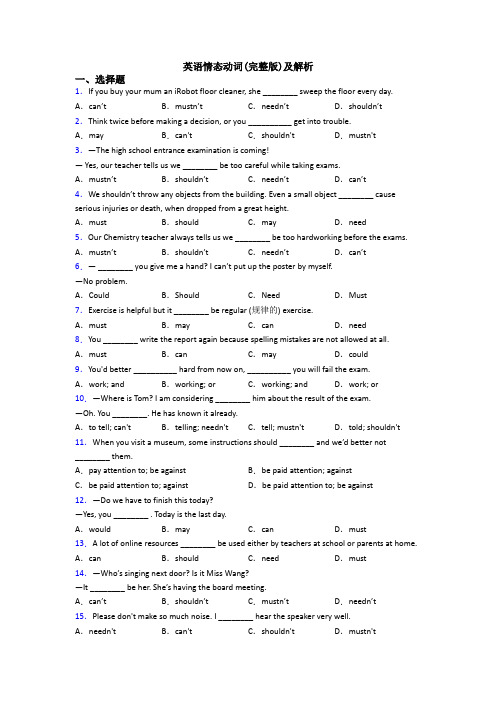
英语情态动词(完整版)及解析一、选择题1.If you buy your mum an iRobot floor cleaner, she ________ sweep the floor every day. A.can’t B.mustn’t C.needn’t D.shouldn’t 2.Think twice before making a decision, or you __________ get into trouble.A.may B.can't C.shouldn't D.mustn't 3.—The high school entrance examination is coming!— Yes, our teacher tells us we ________ be too careful while taking exams.A.mustn’t B.shouldn’t C.needn’t D.can’t4.We shouldn’t throw any objects from the building. Even a small object ________ cause serious injuries or death, when dropped from a great height.A.must B.should C.may D.need5.Our Chemistry teacher always tells us we ________ be too hardworking before the exams. A.mustn’t B.shouldn’t C.needn’t D.can’t6.— ________ you give me a hand? I c an’t put up the poster by myself.—No problem.A.Could B.Should C.Need D.Must 7.Exercise is helpful but it ________ be regular (规律的) exercise.A.must B.may C.can D.need8.You ________ write the report again because spelling mistakes are not allowed at all. A.must B.can C.may D.could9.You'd better __________ hard from now on, __________ you will fail the exam. A.work; and B.working; or C.working; and D.work; or 10.—Where is Tom? I am considering ________ him about the result of the exam.—Oh. You ________. He has known it already.A.to tell; can't B.telling; needn't C.tell; mustn't D.told; shouldn't 11.When you visit a museum, some instructions should ________ and we’d better not________ them.A.pay attention to; be against B.be paid attention; againstC.be paid attention to; against D.be paid attention to; be against 12.—Do we have to finish this today?—Yes, you ________ . Today is the last day.A.would B.may C.can D.must13.A lot of online resources ________ be used either by teachers at school or parents at home. A.can B.should C.need D.must 14.—Who’s singing next door? Is it Miss Wang?—It ________ be her. She’s having the board meeting.A.can’t B.shouldn’t C.mustn’t D.needn’t 15.Please don't make so much noise. I ________ hear the speaker very well.A.needn't B.can't C.shouldn't D.mustn't16.—The high school entrance examination is coming!—Yes, our teacher tells us we _______ be too careful while taking exams.A.mustn't B.shouldn't C.needn't D.can't17.---Will you be back early this evening?---Yes, but I ________ be a little late. Our boss sometimes has extra work for us.A.may B.must C.need D.will18.We’ve discussed every detail of this plan and have got everything ready. But still something __________ go wrong. We still have to be very careful.A.must B.should C.would D.may 19.—Amy, I hear you've got many foreign coins._______ I have a look?—Of course, I'll fetch them for you.A.May B.MustC.Should D.Need20.When I was young, my father ___________ take me to climb the hill which was not far from our house.A.may B.must C.would D.should21.You ______ pay too much attention to your pronunciation, as it is so important in the oral (口头的) test.A.shouldn’t B.mustn’t C.can’t D.needn’t 22.—Would you please________in that way? That’s not safe!—Sorry. I won’t d o it any more.A.not driving B.not to drive C.no driving D.not drive 23.—Ready? Let’s get started, Martin.— Swimming? I just ________ get used to it in winter.A.can’t B.needn’t C.mustn’t D.shouldn’t 24.—Will your mother be at home this Saturday?—Hard to say. She _______go to the countryside to see my grandparents.A.must B.may C.can D.would25.I ________ hear you clearly. Would you please repeat it?A.mustn’t B.can’t C.needn’t D.shouldn’t 26.—Shall I tell him the change of the time right now?—I’m afrai d you ________, otherwise he will be late for the meeting.A.can B.may C.must D.need 27.—Could I join you in the programme?—Sorry, you ________. You are too young.A.shouldn’t B.mustn’t C.can’t D.needn’t 28.—Who is singing next door? It sounds like a youn g girl’s voice.—It _________ be Jane. But she seldom sings English songs.A.need B.must C.may D.can29.—I must go to school today, ________?—No, you ________.You can go as soon as you get well.A.mustn’t I;needn’t B.needn’t I;needn’tC.mustn’t I;mustn’t D.needn’t I;mustn’t30.—How do you like my new dress?—Well, if I ________ say, it is not suitable for you.A.may B.must C.have to D.should31.— Excuse me, could you tell me where the Nanjing Brocade Museum is?— Go along this road for five minutes. You ________ miss it. It’s a huge building.A.mustn’t B.can’t C.needn’t D.shouldn’t 32.—Why didn’t you tell it to me earlier?— Why ________ I? I want to have my own secret.A.can B.may C.should D.shall 33.—Suzy described every detail of the accident just now.—Her memory ________ be completely back.A.shall B.need C.must D.could34.—Is that Mr Zhou?—It ________ be him. He has gone to Beijing.A.can B.may C.can’t D.shouldn’t 35.Never throw objects from the building. Even a small object ________ cause serious injuries, or death, when dropped from a great height.A.must B.should C.may D.need36.— Is the boy over there Tom? He often wears a jacket like that.— It _______ be him. He is absent from school today.A.needn’t B.shouldn’t C.mustn’t D.can’t 37.—Hurry up, Jack! Let’s cross the road as fast as possible.—No, you ________. Don’t you see the light is still red?A.couldn’t B.wouldn’t C.mustn’t D.needn’t 38.When people are waiting at the zebra crossing, cars and buses ________ wait and let them go first.A.must B.may C.can D.need39.—Is it really necessary for me to go shopping with a mask on?—I’m afraid you ________ in public. It is not only to protect yourself but also to protect others. A.must B.should C.can D.need40.—Will dad arrive home at 6 o’clock to ha ve dinner with us this evening?— I think he will, but he ________ not. Sometimes he works extra hours.A.can B.must C.need D.may41.Cars ________ give way to walkers on some roads in Binhai, or the drivers will be fined. A.may B.will C.can D.must42.Mr. Black ________ be at home now. He went abroad on vacation last Friday.A.can’t B.mustn’t C.needn’t D.shouldn’t 43.—Could you tell me how to renew the library books?—With pleasure. You ________ come to our desk every time. It’s easier to renew them online. A.can’t B.mustn’t C.needn’t D.shouldn’t 44.For the safety of the passengers, objects like guns ________ be carried on board.A.may not B.needn’t C.might not D.mustn’t45.— What do you think of the show yesterday?— Some of them were really good but others ________ be better.A.will B.must C.need D.can46.—In China, many students have to stay up late to do their homework.—No worries. The government has realized the problem. I’m sure there ________ be good news soon.A.can B.should C.must D.need47.—May I have some wine to drink?—No, you ________. You have to drive home later.A.mustn’t B.needn’t C.can’t D.may not 48.—________ I see your ID card? We have to check your personal information.—Sure. Here you are.A.May B.Need C.Should D.Must49.You ________ be careful with the camera. It costs!A.can B.will C.should D.may50.You ________ pay too much attention to protecting yourself if you plan to go abroad. A.mustn’t B.can’t C.shouldn’t D.needn’t【参考答案】***试卷处理标记,请不要删除一、选择题1.C解析:C【详解】句意:如果你给你妈妈买一台扫地机器人,她就不必每天扫地了。
- 1、下载文档前请自行甄别文档内容的完整性,平台不提供额外的编辑、内容补充、找答案等附加服务。
- 2、"仅部分预览"的文档,不可在线预览部分如存在完整性等问题,可反馈申请退款(可完整预览的文档不适用该条件!)。
- 3、如文档侵犯您的权益,请联系客服反馈,我们会尽快为您处理(人工客服工作时间:9:00-18:30)。
2.s when we were carrying out the investigation, or they __________to our help.
A.would have comeB.could come
A.shallB.must
C.mayD.need
【答案】A
【解析】
【详解】
考查情态动词。句意:法律面前人人平等。没有人能凌驾于法律之上。A. shall用于第二、第三人称,则含有命令、警告、允诺或威胁的语气。B. must(必须,一定)用于肯定句。C. may(可以,能够)表允许时一般不与第三人称连用。D. need (表示没有必要或询问是否有必要)需要;故选A。
【详解】
考查部分倒装和情态动词。句意:这位教授警告学生们,在他的课堂上,决不应该使用手机。on no account意为“决不”,否定词放在句首,句子使用部分倒装,排除B、D项;这里表示应该,故选A。
7.Lack of sleep _______ lead to weakened immunity and memory, and also slow physical growth.
5.“should / ought to + have +过去分词”表示过去本该做某事但没做,其否定式表示过去不该做某事但做了,这种句式含有不满或责备之意,ought to的语气比should强一些。如:
You ought to / should have studied harder.你本应该更努力学习的.(但没有)
A.mustn'tB.can't
C.won'tD.needn't
【答案】B
【解析】
D[考查虚拟语气。句意:不可能是邮递员在门口,才六点钟呢。mustn't禁止,不允许;can't不可能;won't不愿意,就是不,偏不;needn't不需要。]
13.—I feel a little nervous.
—Take it easy. You __________ have difficulty passing the exam when you have prepared for it well.
A.mustn’tB.needn’tC.may notD.shouldn’t
6.The professor warned the students that on no account ________ use mobile phones in his class.
A.should theyB.they should
C.dare theyD.they dare
【答案】A
【解析】
【答案】D
【解析】
【详解】
考查情态动词。句意:——我觉得有点紧张。——不要着急。当你准备充分时,通过考试应该不会有困难。A. mustn’t禁止,不允许;B. needn’t不必;C. may not可能不会;D. shouldn’t不应该。结合句意可知答案为D。
14.It ________ be the postman at the door. It's only six o'clock.
---Sorry, sir. But it is the management rules of our hotel that payment ______________ be made in cash.
A.shallB.need
C.willD.must
【答案】A
【解析】
【详解】
考查情态动词词义辨析。A. shall用于法律法规或条文中,表示义务、规定等;B. need需要;C. will会;D. must必须。句意:——我能用信用卡支付么?——对不起,先生,现金支付是我们酒店的管理规定。故A项正确。
I guess the poet would have been about twenty when she wrote her first poem.
Another worker wouldn't have acted like that.
4.The room is so clean. He ________ have cleaned it yesterday evening.
【点睛】
情态动词+ have done结构:
1.“must + have +过去分词”表示对过去发生的事情或状态进行推测,语气比较坚定,通常只用于肯定句。如:It must have rained last night,for the ground is wet.
2.“can / could + have +过去分词”表示对过去某种情况的怀疑或不确定。can和could一般用于否定句和疑问句,could的语气较can弱。如:He can't have finished the work so soon.
3.The accident which left 15 people on board dead ________ if both the angry female passenger and the bus driver had kept calm.
A.should have avoidedB.should be avoided
9.I still find it hard to imagine that such a clever child __________ make such a foolish mistake.
A.shallB.must
C.canD.should
【答案】D
【解析】
【详解】
考查情态动词。句意:我仍然难以想象这样聪明的孩子竟然犯这样愚蠢的错误。should作为情态动词,可以用来表示意外、惊喜或者在说话人看来是不可思议的,常常译为"竟会"、"居然",这么聪明的孩子竟然犯这样愚蠢的错误。表示意外,shall表示允诺,命令等,must表示必须,can表示能力及可能性。所以答案选D。
10.No driving after drinking is a rule that every driver ____________ obey in our country.
A.willB.shall
C.mayD.can
【答案】B
【解析】
试题分析:考察情态动词。A.将要B.将要C.可能D.可以。Will表示请求、建议、意志、愿望和决心。Shall用于第二、第三人称,表示说话人给对话的命令、警告、允诺或威胁。May表示请求和允许;用于祈使句表示决心;表示推测、可能性。Can表示能力;请求和允许。句意:酒后驾车是每一位驾车者在我们国家应当遵守的规则。故选B。
A.shallB.mustC.shouldD.can
【答案】D
【解析】
【详解】
考查情态动词辨析。句意:睡眠不足会导致免疫力和记忆力下降,还会减缓身体发育。A. shall将;B. must必须;C. should应该;D. can会,表示理论上或是逻辑判断上,用can,故选D。
8.---Can I pay the bill by credit card?
考点:考察情态动词
11.—Can I pay the bill by check?
—Sorry,sir.But it is the management rules of our hotel that payment _____ be made in cash.
A.shallB.need
C.willD.can
A.willB.need
C.canD.must
【答案】D
【解析】
【详解】
考查情态动词表推测。句意:房间如此干净,他一定是昨天晚上打扫过了。must have done表示对过去发生的事情有把握的猜测,意思是“一定(做过)”,故D项正确。
5.he law is equally applied to everyone. No one _______ be above it.
【点睛】
本题是高考必考考点,一定要牢记句型意思。must have done过去肯定做了某事。should have done本应该做而实际未做。can’t have done过去不可能做了某事;shouldn’t have done本不应该做而实际做了。need have done本有必要做某事而没做;needn’t have done本没有必要做某事;注意没有mustn’t have done的形式。
情态动词(完整版)
一、单项选择情态动词
1.You ________ give me a lift. I want to walk home for exercise.
A.needn’tB.couldn’tC.can’tD.mustn’t
【答案】A
【解析】
【详解】
考查情态动词。句意:你不必让我搭车。我想步行回家锻炼身体。A. needn’t不必;B. couldn’t不能;C. can’t不会;D. mustn’t禁止,不允许。根据I want to walk home for exercise.可知,你不必让我搭车。故选A。
C.could have avoidedD.could have been avoided
【答案】D
【解析】
【详解】
考查“情态动词+完成式”。句意:如果愤怒的女乘客和巴士司机保持冷静,这起导致15人死亡的事故本来是可以避免的。could have done“本来能做而没有做”,且句子主语The accident和谓语动词avoid之间是被动关系,结合句意可知答案为D。
A.need have doneB.must have done
